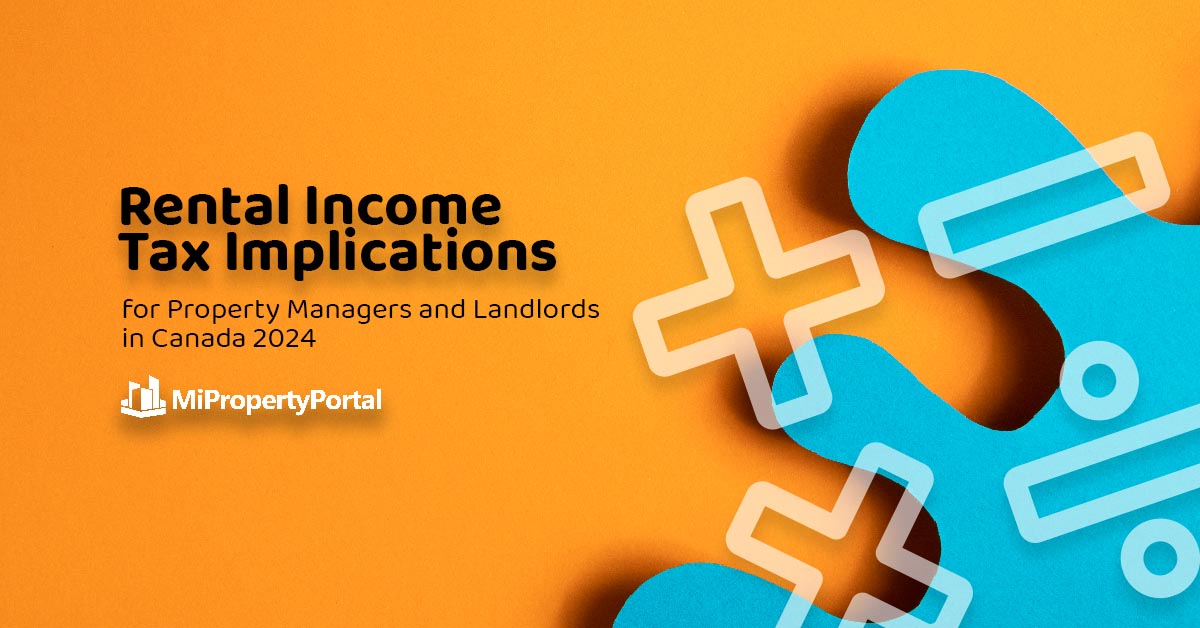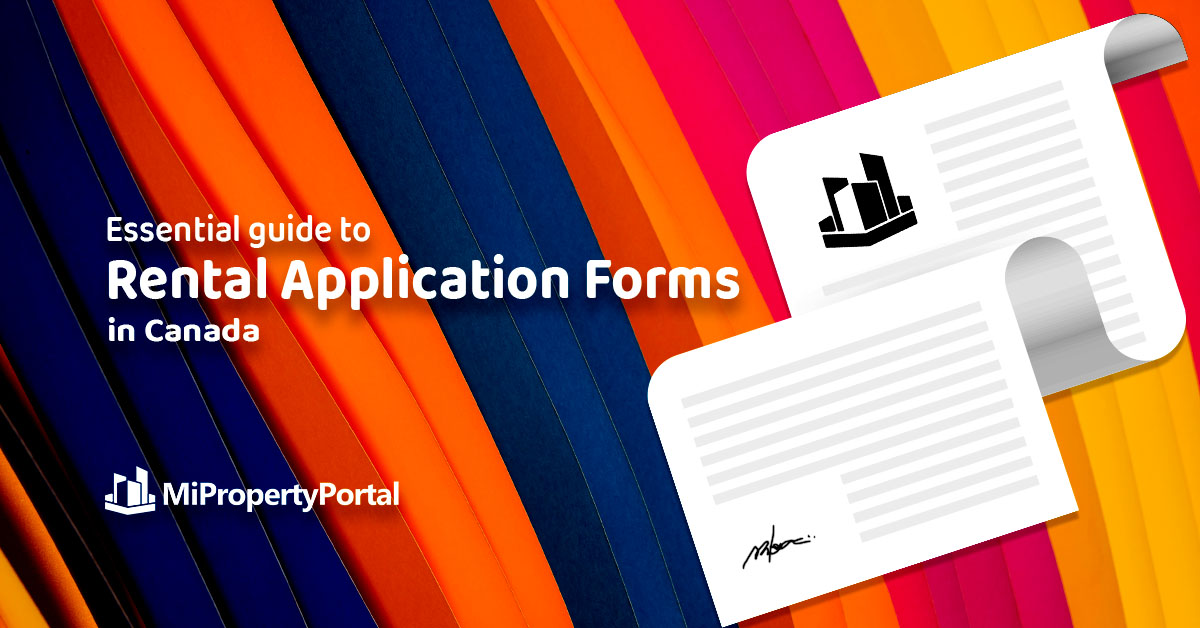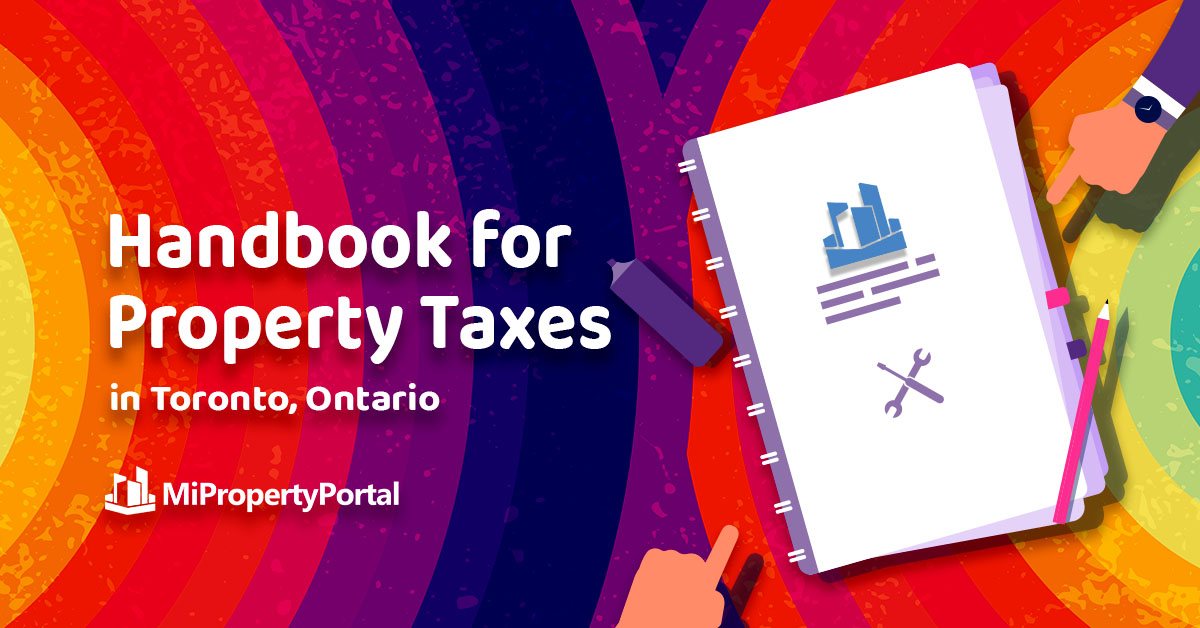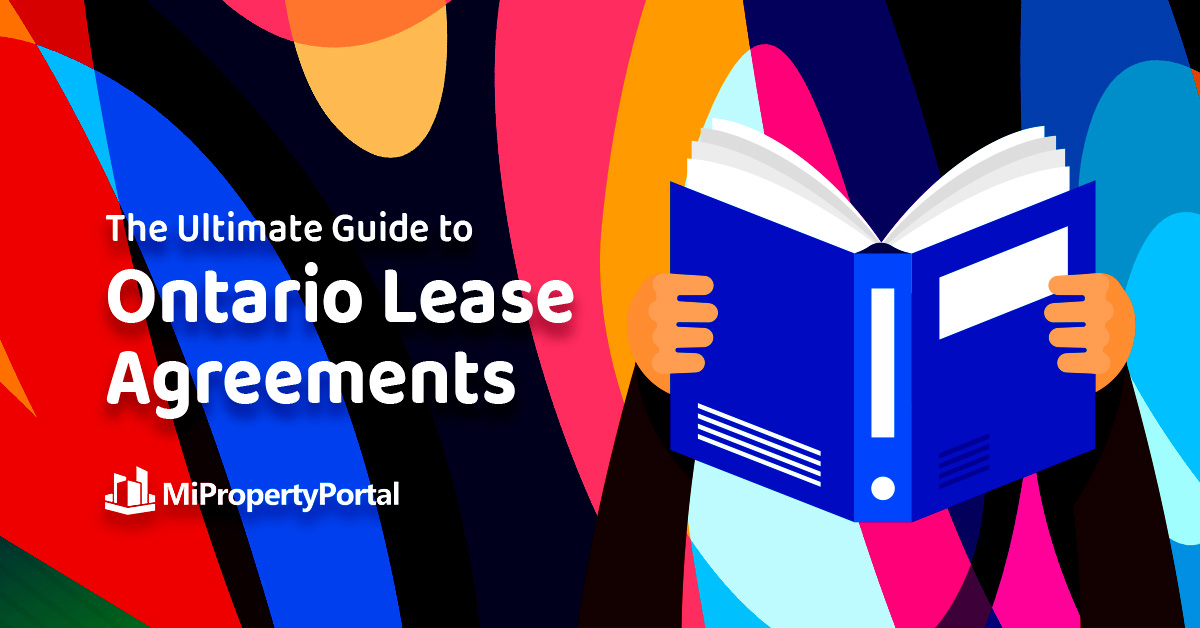In Guide
Rental Income Tax Implications for Property Managers and Landlords in Canada 2024

Mi Property Portal
December 9, 2023 - 10 min read
Rental income is different from other forms of income, and rental income tax is handled differently. Property managers and landlords can make successful competitive strategies by understanding the nuances of rental income tax.
In this article, we will dive into the Tax Implications for Property Managers and Landlords in Canada and Rental Income Tax updates for 2024.
How is Rental Income Taxed in Canada?
It depends on the property ownership type and the range of services you provide for the tenant.
Your income will be considered as residential rental income if you lease the property and provide basic services such as laundry services, lighting, heat, parking, etc.
Rental Income Tax is reported on the T776 form of the Canada Revenue Agency (CRA). You can download it by clicking here. Learn how to complete Form T776, Statement of Real Estate Rentals, by clicking here.
Your income will be considered as business income if you provide additional services such as cleaning, security and meals, to tenants. The likelihood that your rental operation is a business increases with the more services you offer.
Business Income Tax is reported on the T2125 form of the Canada Revenue Agency (CRA). You can download it by clicking here. Learn more about it from the T4002 Guide – Self-employed Business, Professional, Commission, Farming, and Fishing Income.
Also, the Property Ownership type determines how much rental income to declare. For example, a sole owner has to declare 100% of the income on the T1 personal income tax return, and a Co-owner has to declare his or her portion of the Rental Income. We will not discuss a corporation in this article.
How Much is the Tax Rate for Rental Income in Canada?
The tax rate on rental income in Canada is the same as your marginal tax rate since your net rental income would be in addition to your other sources of income (such as your salary, business income and investment income).
For a partnership real estate venture, the tax is calculated according to the share of income, and the partners are taxed separately.
You can use this online tax calculator to calculate your rental income tax according to your province easily.
For corporations, it depends on your province whether your business qualifies for Small Business Deduction (SBD) or General Rate Reduction (GRR). etc.
Reporting Rental Income: Cash Basis vs. Accrual Basis
Cash Basis
Under the Cash Basis, income is recognized when it’s received, and expenses are recorded when they’re paid. This method provides a straightforward approach, aligning with the actual cash flow in and out of your rental property.
For property managers and landlords who prefer simplicity and want to track income and expenses based on real transactions, the Cash Basis is the choice. It’s applicable for those managing smaller properties with simple financial structures. However, there are specific criteria for the Canada Revenue Agency (CRA) to accept cash basis reporting.
Accrual Basis
Accrual Basis reports income when it’s earned and expenses when incurred, regardless of the actual cash flow. This method views transactions when they occur, not necessarily when the money changes hands.
Accrual Basis reporting is suitable for property managers and landlords overseeing larger portfolios or dealing with more complex financial arrangements.
Rental Losses
You are experiencing a rental loss if your rental expenses exceed your gross rental income. You can deduct your rental loss against your other sources of income if you have to pay expenses to make money.
Tax Deductions on Rental Property
You may deduct certain costs from your rental income before you pay income tax on it. This will reduce the amount of net rental income that is taxable and reported on your tax return. To minimize the amount of rental income tax, be aware of all the expenses you can deduct.
Some of the common tax deductions on rental property are as follows:
Utilities
If the landlord pays for the utilities instead of the tenant, these expenses can be deducted.
Property Taxes
Property Taxes can be deducted from Gross Rental Income for the time period the property was leased or vacant.
Insurance
The property manager or the landlord can write off the insurance premiums for the rental property. If insurance premiums of some years are paid at once, you can deduct only up to the amount that covers the current year’s coverage.
Maintenance and Repairs
It is possible to deduct the expenditures of regular maintenance and small repairs from rental income for the property and the land. Deducting expenses for repairs exceeding the property’s useful lifespan or enhancing it beyond its original state is not permissible. These would fall under the category of capital costs.
Professional Fees
These cover legal services associated with leasing the property (such as drafting contracts and collecting past-due rent). Legal service deductions do not cover the legal fees paid at the time of purchase. These are incorporated into the property’s capital cost.
Marketing and Advertising
Costs associated with promoting the property to attract tenants are deductible, whether incurred through digital or traditional media channels.
Management and Administration Fees
The fees to hire a company to manage your property, collect rent, and find tenants are tax deductible.
Salaries, Wages, Benefits
You can deduct all of these costs if you hire superintendents or other staff to help manage your rental property. You are unable to deduct Self Salary.
Interest Fees
You can deduct the interest charges on your mortgage, as well as expenses related to operations, loans and credit cards.
For credit cards or loans, it’s essential that the funds are used exclusively for rental property expenses to qualify for interest fee deductions.
Home Office
Part of the interest on your principal residence mortgage, insurance, utilities, internet bill, and other bills that are directly relevant to managing your real estate business can be deducted.
Additionally, you can deduct all office-related expenses relevant to the operations of your real estate business. It’s crucial to consult with your accountant to avoid any misreporting.
Depreciation
Appliances and similar assets will eventually need to be replaced. Thus, it is recommended that the depreciating costs be reported. An accountant will guide and handle that part of filing your tax return.
Modern fixtures and fittings can provide substantial depreciation savings even on older properties.
Capital Cost Allowance
Your buildings, equipment and furniture are classified as depreciable property. The initial cost of these properties can’t be deducted all at once when calculating net rental income, but you can deduct a portion of the cost each year over a period of several years. This is called capital cost allowance. The amount of capital cost allowance that can be deducted annually depends on each type of depreciable property.
Goods and Services Tax (GST)
The federal government of Canada imposes the Goods and Services Tax (GST) on the supply of goods and services, and the rental property industry has some relevance.
Residential rental income is generally GST-exempt. This implies that residential property owners who rent out their properties for a living are not obliged to collect or pay GST on the rent they charge. But it’s important to remember that not all kinds of rental properties are covered by this exemption.
Commercial properties are considered differently than residential properties. GST may apply to the rental revenue derived from commercial properties leased by a landlord.
Learn more about rental income, rental income tax, Classes of depreciable property and much more by clicking here.
New Updates for Rental Income Tax for 2024 in Canada
Employee Ownership Trust (EOT)
Employee Ownership Trust (EOT) is a special kind of ownership where a trust holds company shares for its employees. With EOTs, employees can become owners of a business without having to spend their own money to buy shares.
In the 2023 federal budget, there were changes to the Income Tax Act that allowed EOTs in the country starting next year. If you sell your business to an EOT and make a profit (called capital gains), you might not have to pay taxes on the first $10 million with some conditions. This special offer is for the 2024, 2025, and 2026 tax years.
Underused Housing Tax (UHT)
In 2021, the government introduced a new tax called the Underused Housing Tax (UHT). It’s just one percent of the value of homes in Canada owned by people who don’t live here all the time or don’t use their homes much. This tax started on January 1, 2022.
Now, if you own a house in Canada, you need to inform the government if you’re not the “excluded owner.” Even if you’re a company, partnership, or trust, you still have to share the details every year, even if you don’t have to pay the tax because you’re mostly Canadian-owned. By this, the government ensures that everyone is paying their fair share.
MIPropertyPortal (MIPP) is an All-in-One Property Management Software built exclusively for Canadian Landlords and Property Managers. It provides a 360-degree solution and automated functions, complying with Canadian rules and regulations. You can get your job done with some clicks without having the headache of managing numerous Excel files for your real estate portfolio. All the features mentioned above are offered exclusively by MIPP and the platforms surpasses the trends with more innovation.
Conclusion
In a nutshell, proactive tax management defines financial success for property managers and landlords. By understanding the ins and outs of rental income tax, you can stay compliant and implement strategic planning for maximum success.
For rental income tax purposes, it is highly recommended to take the guidance of a tax professional.
Frequently Asked Questions (FAQs)
Rental income tax depends on various factors such as the range of services you provide, ownership type, type of property (commercial or residential), etc.
Yes. Legal ways, such as incorporating a business and maximizing deductions, can minimize tax liability.
GST can apply to rental income from commercial properties. Though residential rental income is exempt, it's essential to know the implications and exemptions from a professional.
Tax laws can change, and staying informed about updates is essential for proper real estate venture strategies.
Hiring a tax professional can provide valuable insights and ensure compliance with rules and regulations. BE sure to keep all relevant records.
Rental income in Canada is taxed at your marginal tax rate. Property managers and landlords must report this income on their tax return, ensuring correct reporting.
Property management fees are deductible. These fees are considered an operating expense and can be claimed to reduce taxable rental income.
While regular maintenance expenses are deductible, capital improvements, such as renovations, are usually depreciated over time using the Capital Cost Allowance (CCA).
Incorporating your business can offer tax advantages, including income splitting and potential tax deferral. Consult with a tax professional to understand the rules.
Keep detailed records of income and expenses, maintain receipts, and seek professional guidance if needed.
Non-compliance can result in penalties and legal blows. Stay informed, meet filing deadlines, and seek professional advice to ensure compliance.


